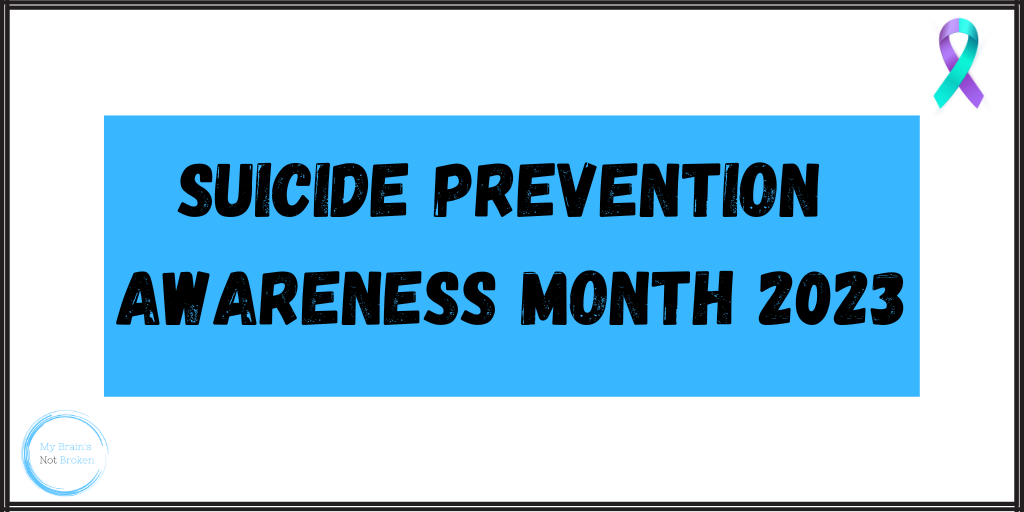
CW: This post discusses suicide and suicide-related topics.
In case you don’t know, September is Suicide Prevention Awareness Month in the United States. Each year, I do my best to use this month as an opportunity to share information, statistics, and resources related to suicide prevention. Suicide is not only an extremely serious issue, but also a public health problem. We cannot continue to ignore this issue, no matter how difficult it may be to talk about it. Suicide prevention means talking, sharing our stories, and reminding others that they are not alone.
I have been writing about suicide prevention and suicide-related topics since I started this blog six years ago. It is something very personal and close to my heart, both as a mental health advocate and as a person. I understand the struggle of sharing your story, being afraid to tell someone that you are suffering or that you no longer want to be here. It’s one of the reasons I started My Brain’s Not Broken to begin with. I was struggling to share my experience and tell my story. At some point, the idea of starting a blog took hold, but it was still years before I got going. As much as I wanted to try to tell my story, it was still difficult.
And we know why it is difficult. We see why it is difficult, every day, to be vulnerable in our society. We don’t want to appear weak. We want it to look like “we have it all” (I still don’t know what that means). We don’t want people to worry about us or control us. And the shame… oh, the shame. We are ashamed of our pain, ashamed of even having it to begin with. All of these reasons, and many more, are why people don’t seek help when they are suffering.
Sometimes the consequences of that are not so serious. There are levels to pain, just as there are levels to every type of emotion we experience. And that’s why suicide prevention is so important: it is truly a life or death situation. There is a seriousness to this topic, a weight that makes it difficult to talk about. But that is exactly why we should be talking about it. Because if we don’t know what we’re facing, how can we fight it?
In recent decades there has been an enormous amount of research and data on suicide in the United States. These data have been useful in recognizing that suicide is a public health problem. Which in recent decades has become one of the leading causes of death in the United States, even when it is recognized that this data is not reported. This problem is not going anywhere and, as we have seen, it becomes more frequent as time goes by.
So what do we do? How we talk about a topic that is painful, heavy. and personally tax millions of people? I don’t have an easy answer to that question, but the best one I have is this: we started trying. We started trying to have conversations we hadn’t had before. We recognize that there are groups of people who are at higher risk for suicide and we make sure people have the resources they need. We started trying to talk, but we also started trying to listen. Sometimes people can’t share their stories unless they are given space to do so. Suicide, like mental illness, does not discriminate. I don’t say that to scare you or make you feel defeated; far from there. If someone can be affected, shouldn’t we stick together? Shouldn’t we be stronger that’s why? I think so. in fact, I know so.
This month, I hope to use this blog as a space to share statistics and resources about suicide and its prevention. But I also hope to use this space to share people’s stories. If you have a story to share, please contact me; I would love to give you a platform to speak this month. We are stronger together and by lifting each other up we can get out of the darkness together.








